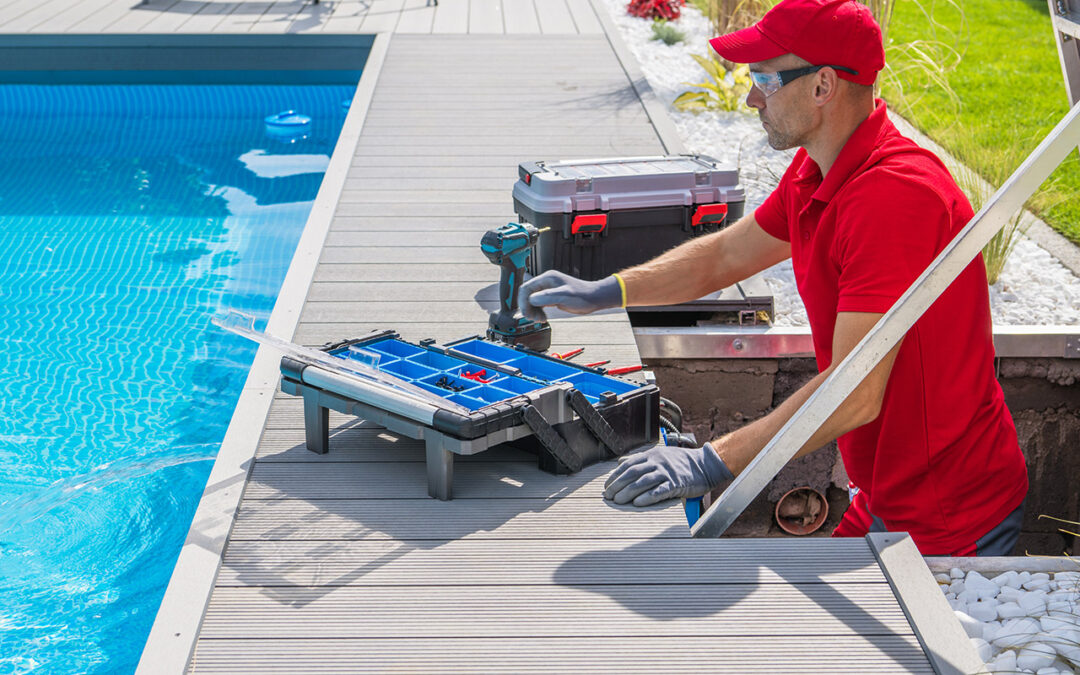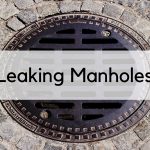Introduction
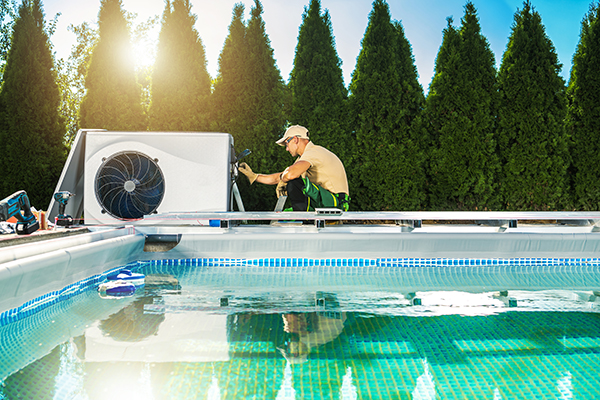 Having a swimming pool in your backyard is a fantastic luxury, especially in the hot climates of the Middle East. However, maintaining it can be a challenge, and possibly the most common issue pool owners face is leaks. Detecting and fixing leaks promptly is crucial to avoid wasting water, increasing maintenance costs, and causing potential structural damage.
Having a swimming pool in your backyard is a fantastic luxury, especially in the hot climates of the Middle East. However, maintaining it can be a challenge, and possibly the most common issue pool owners face is leaks. Detecting and fixing leaks promptly is crucial to avoid wasting water, increasing maintenance costs, and causing potential structural damage.
Why Swimming Pool Leaks are a Big Deal
Swimming pool leaks are more than just a nuisance; they can lead to significant problems:
- Water Wastage: Leaks lead to a substantial loss of water, which is particularly concerning in areas with water scarcity.
- Increased Maintenance Costs: Constantly refilling the pool and addressing related issues can become expensive.
- Potential Structural Damage: Unchecked leaks can damage the pool’s structure, leading to costly repairs.
Common Causes of Swimming Pool Leaks
Understanding the common causes of pool leaks can help in prevention and early detection:
- Structural Cracks: Shifts in the ground or poor construction can cause cracks in the pool’s shell.
- Plumbing Issues: Faulty pipes or joints can leak, especially in older pools.
- Equipment Failure: Leaks can occur in the pool’s filtration and pumping systems.
Signs of Swimming Pool Leaks
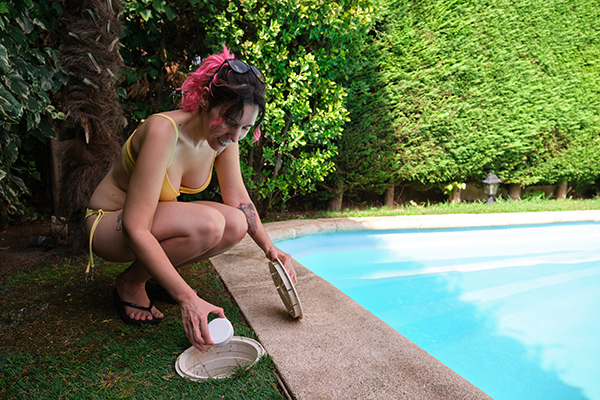 Being vigilant about the signs of a pool leak can save you from extensive repairs. Look out for:
Being vigilant about the signs of a pool leak can save you from extensive repairs. Look out for:
- Unexplained Water Loss: A significant drop in water level without any apparent reason.
- Algae Growth: Algae can thrive if there’s a constant flow of fresh water diluting the pool chemicals.
- Wet Spots Around the Pool Area: Patches of wet ground or erosion around the pool can indicate leaks.
DIY Methods to Detect Swimming Pool Leaks
Before calling a professional, try these DIY methods to identify potential leaks:
- The Bucket Test: Place a bucket filled with water on the pool step and mark the water level inside and outside the bucket. If the pool water level drops more than the bucket water, you have a leak.
- Dye Test: Use a dye to trace the leak by squirting it near suspected areas. If the dye gets sucked into a crack or hole, that’s where the leak is.
- Checking the Pool Equipment: Inspect the pump, filter, heater, and pipes for any signs of leaks.
Advanced Leak Detection Techniques
For more accurate leak detection, professionals use advanced techniques:
- Pressure Testing: This involves pressurizing the plumbing system to check for drops, indicating leaks.
- Electronic Listening Devices: These devices can detect the sound of water escaping from pipes.
- Thermal Imaging: Cameras that detect temperature differences can locate leaks behind walls or under the ground.
How to Fix Structural Leaks
Addressing structural leaks requires prompt and effective solutions:
- Patching Small Cracks: Use pool putty or epoxy to seal minor cracks.
- Resurfacing the Pool: For extensive cracking, resurfacing the entire pool might be necessary.
- Professional Repairs: For significant structural damage, hire a professional to ensure a thorough and lasting fix.
Addressing Plumbing Leaks
Plumbing leaks need careful attention:
- Inspecting and Replacing Faulty Pipes: Regularly check pipes for damage and replace them as needed.
- Sealing Pipe Joints: Use high-quality sealants to secure pipe joints.
- Hire a Certified Professional Plumber: For complicated plumbing issues, a professional plumber’s expertise is invaluable.
Repairing Equipment Leaks
Pool equipment leaks are common but manageable:
- Fixing Leaks in Pumps and Filters: Regularly inspect and maintain pumps and filters to prevent leaks.
- Replacing Worn-Out Seals and Gaskets: Ensure all seals and gaskets are in good working order and replace them if they show signs of wear.
- Regular Equipment Maintenance: Routine maintenance can prevent leaks and prolong the lifespan of your equipment.
Preventative Measures to Avoid Pool Leaks
Taking proactive steps can prevent leaks from occurring:
- Regular Inspections: Arrange regular inspections of your pool and its components.
- Proper Pool Maintenance: Maintain balanced water chemistry and clean the pool regularly.
- Using Quality Materials: Invest in high-quality materials for pool construction and repairs.
The Role of Pool Covers and Liners
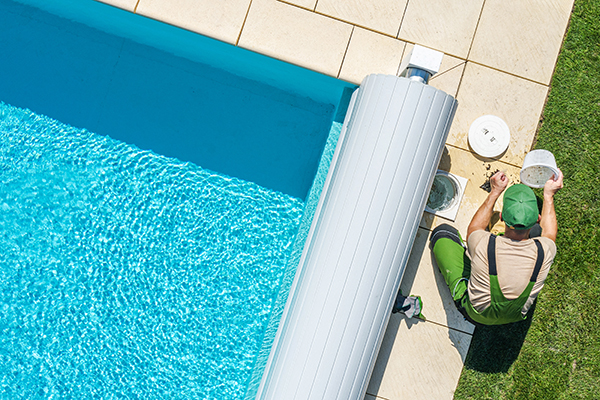 Using pool covers and liners can significantly reduce the risk of leaks:
Using pool covers and liners can significantly reduce the risk of leaks:
- Benefits of Using Pool Covers: Covers reduce evaporation and keep debris out of the pool, preventing potential damage.
- How Liners Can Prevent Leaks: Liners provide an additional layer of protection against leaks.
- Choosing the Right Cover and Liner: Select covers and liners made from durable materials that fit your pool properly.
Seasonal Maintenance Tips
Seasonal changes can affect your pool’s integrity:
- Winterizing Your Pool: Properly prepare your pool for winter to avoid damage from freezing temperatures.
- Preparing for Summer: Ensure the pool is clean, chemicals are balanced, and equipment is functioning correctly.
- Regular Cleaning and Chemical Balancing: Maintain cleanliness and chemical balance throughout the year.
The Cost of Ignoring Pool Leaks
Ignoring pool leaks can lead to severe consequences:
- Escalating Repair Costs: Small leaks can turn into significant problems requiring expensive repairs.
- Impact on Property Value: Persistent leaks can decrease your property’s value.
- Environmental Concerns: Water wastage from leaks is environmentally irresponsible, especially in regions with water scarcity.
Long-Term Benefits of Prompt Leak Repairs
Addressing pool leaks promptly offers numerous benefits:
- Preserving the Pool’s Integrity: Regular maintenance and prompt repairs ensure the longevity of your pool.
- Ensuring a Safe Swimming Environment: Preventing leaks maintains a safe environment for swimmers.
- Saving Money on Long-Term Maintenance: Early repairs are typically less expensive than fixing extensive damage later.
Conclusion
Swimming pool leaks can cause significant damage and waste valuable resources if not detected and repaired promptly. Regular inspections, maintenance, and using advanced leak detection techniques can help keep your pool in top condition. By taking proactive measures and addressing leaks quickly, you can enjoy a well-maintained, leak-free swimming pool for years to come.
FAQs
- How often should I check my pool for leaks? It’s recommended to inspect your pool for leaks at least twice a year and whenever you notice signs of water loss.
- Can I fix a pool leak myself? Minor leaks can often be fixed with DIY methods, but significant leaks or structural damage should be handled by professionals.
- How much does it cost to repair a pool leak? Repair costs vary depending on the severity of the leak and the required repairs, ranging from a few hundred to several thousand dollars.
- What should I do if I suspect a leak? Perform DIY tests to identify the leak and contact a professional if you cannot find or fix the leak yourself.
- Are there any tools to help detect pool leaks? Yes, there are various tools, such as electronic listening devices, thermal imaging cameras, and smart leak detectors, that can help identify pool leaks.
If you think you may have a swimming pool leak, contact us now to book an inspection by clicking the button below.
